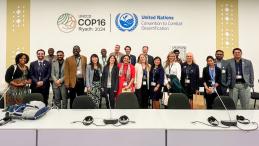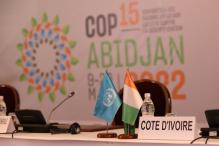On 11 December 2024, UNU-IAS organized a side event of the sixteenth session of the Conference of the Parties of the United Nations Convention to Combat Desertification (UNCCD COP16) in Riyadh, Saudi Arabia. The event explored how landscape approaches can bridge the gaps between environmental and development policies while promoting sustainable and inclusive practices. It highlighted the International Partnership for the Satoyama Initiative (IPSI), a global partnership of over 300 organizations, including governments, Indigenous Peoples and Local Communities (IPLCs), NGOs and research institutes, among others.
Suneetha M Subramanian (Research Fellow, UNU-IAS) emphasized that landscape approaches recognize and reconcile diverse values of landscapes and seascapes, such as economic and spiritual, moving beyond profit maximization to foster more equitable and caring economies. She stressed that IPSI partners engage in collaborative discussions to advance sustainability and align local actions with broader policy goals.
Rissa Edoo (Partnership Specialist, UNDP GEF Small Grants Programme) presented the Community Development and Knowledge Management for the Satoyama Initiative (COMDEKS), a collaborative effort supported by the Ministry of Environment of Japan, the Keidanren Nature Conservation Fund, UNU-IAS and IPSI. COMDEKS provides financial and technical support to IPLCs and civil society, enabling local projects that address environmental challenges such as restoring ecosystem functions, enhancing biodiversity and building sustainable livelihoods. A video presention highlighted the transformative work of Andean women in Puno, Peru. Their ancestral knowledge and sustainable practices revitalized degraded landscapes, turning arid areas into verdant ecosystems.
Speaking from the perspective of an IPSI partner, Fatai Aina (Executive Director, Friends for Francophone Africa-Benin (AMAF-Benin)) underscored the need for integrated ecosystem management based on stakeholder participation, sustainable activities, payments for ecosystem services and holistic approaches that ensure the health of ecosystems while enhancing community well-being. He reiterated the importance of preserving mangroves and agroecosystems as part of the broader fight against climate change and efforts to improve livelihoods.
UNU-IAS co-organized another side event of UNCCD COP16 discussing the role of landscape approaches in enhancing socio-ecological resilience and addressing challenges in land and water management.



